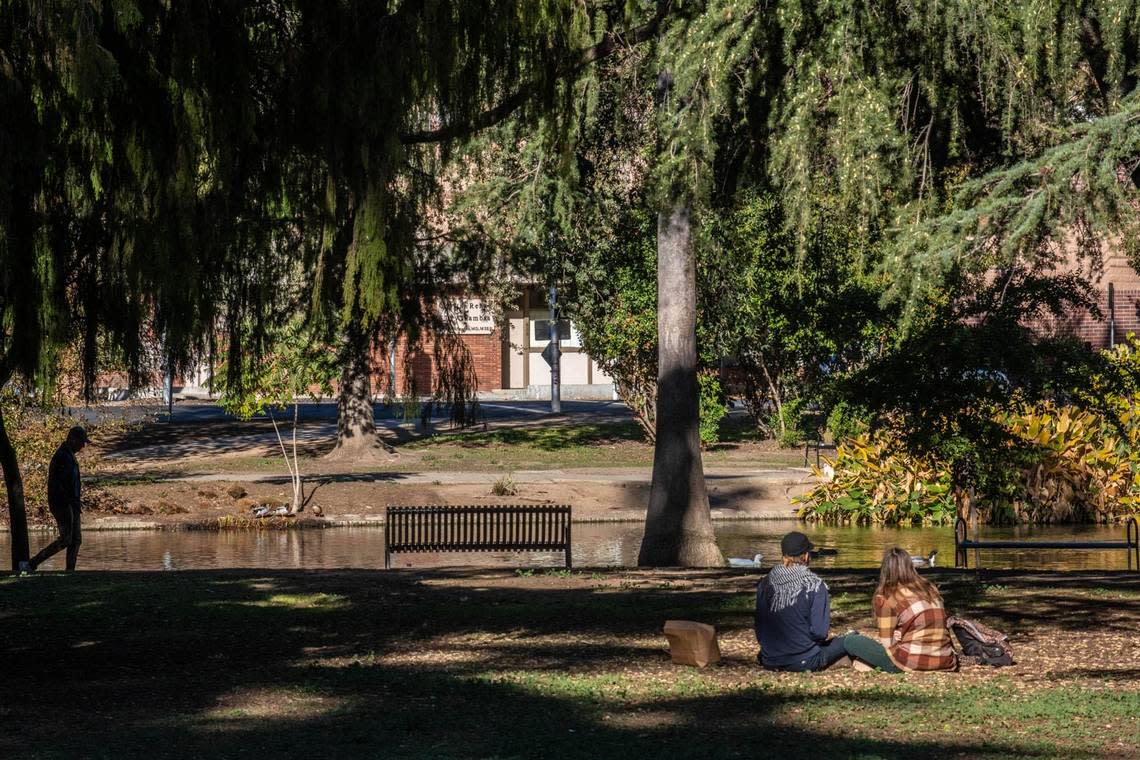Higher park and recreation fees in Sacramento budget will hinder access, residents say

Kassie Noble, whose young daughters are enrolled in a summer camp at the Coloma Community Center, pays $100 each for a week of 9 a.m. to 2 p.m. programming.
“It makes it really affordable to have them in there with the price that it is now,” Noble said. “If they made it more expensive, it would not be an option for us.”
But that might soon change.
In its budget for the upcoming fiscal year, the city of Sacramento, facing a $66 million deficit, slashed more than 40 vacant positions and raised fees for city services ranging from street parking to parks and recreation programs, potentially including the one Noble’s daughters attend.
Community leaders and local parents say that requiring residents to pay more for park facilities and enrichment programs will create barriers to access.
One major source of fee increases in the Department of Youth, Parks, and Community Enrichment will be for the use of Community Center services, including programs, facility and room rental, and services like youth and teen summer camp that were previously free.
Fee increases will vary program to program and take effect on Sept. 1, or as labeled in YPCE’s Come Out and Play program catalog. The budget for YCPE includes about $2.4 million in projected revenue, largely attributed to these prospective fee increases, as well as $2.2 million in other cost saving measures.
YPCE offers multiple free programs for youth, including afterschool programming at five community centers, Sacramento START in the Robla School District, special events and youth workforce development programs.
In May, the City Council also approved recommendations from Mayor Darrell Steinberg for various restorations to the budget, including around $1.2 million for YPCE. The restored funding will support scholarships for youth programs, fee waivers for community center space rentals, and sports field and bike trail maintenance.
Some of the cuts to employee positions may affect service hours, despite the positions being currently vacant. In YPCE, for example, the deletion of two program management positions will “reduce program service levels, facility operations and safe space hours.”
“The positions were initially filled but both incumbents have since been transferred to enterprise-funded positions, which vacated the two positions that were then deleted,” said Tim Swanson, a spokesman for the Office of the City Manager.
The budget further eliminates fee waivers for youth programs that are currently subsidized with free or low costs, such as Community Center Camp sites, Jr. NBA, Jr. Giants and various aquatic programs. Other fee increases include youth and adult sports field rentals, a regional travel program, and aquatics programs.
In one case, certain youth sport rental fields will see fee hikes from $3 per hour to $6 per hour. Adult fees will be raised from $18 per hour to $25 per hour.
Community response to city cuts
In April, the Oak Park Neighborhood Association sent a letter to YPCE regarding community feedback on the Parks Plan 2040, which will guide the city’s management of parks over the next 20 years. In the letter, OPNA specifically listed investment in youth programming as a key priority among Oak Park residents.
“Youth services are definitely a big deal because we have unfortunately seen a lot of youth violence since the pandemic began in neighborhoods like Oak Park and Meadowview and North Sacramento and Parkway,” said Adrian Rehn, president of the group. “And a lot of that is frankly because a lot of the youth — they don’t have things to do on Friday evenings, for example. And a lot of these programs are things that bring youth together.”
Rehn added that when city-sponsored youth programs are deprioritized, community-based organizations have to step in to provide those services.
“CBOs that don’t have much funding to do that get real stretched,” Rehn said.
Councilmembers Mai Vang and Katie Valenzuela voted against the final budget, writing in a joint public statement that they have seen the City Council increase police department funding by almost $100 million since they both first took office in 2020.
“Sacramentans still do not feel safe,” they said. “Research and our own experience have shown that simply giving more funding to the police does not lead to safer or healthier outcomes in our neighborhoods.”
The police budget increased from the previous year by $28 million. Swanson noted that almost every departmental budget increased, including the fire department by $29 million, public works by $24 million and YPCE by $3.5 million.
Overall, the YPCE budget increase added funding to the divisions of park maintenance and planning, administration and safety, and office of youth development. The community enrichment and youth divisions of YPCE will see cuts totaling over $300,000.
Beyond youth programs, programs for adults with physical and intellectual disabilities will also face changes. The decrease in funding will involve “eliminating or exploring alternative options for three major regional camps” for such adults with disabilities, according to the budget.
“In past years, YPCE organized out-of-town trips to various camps,” Swanson said. “In the years since the COVID-19 pandemic, participation numbers have decreased and costs to organize the trips increased. Through this budget process, staff realigned resources to offer other programming options including an in-town summer camp for adults with physical and intellectual disabilities at the North Natomas Community Center.”
Camps involving out-of-town travel for adults with disabilities currently include camping near Lake Tahoe, cycling and climbing in Yosemite National Park, and skiing and snowboarding.
Rehn said that overall, the new fees and changes to programs are “definitely going to be a challenge” for under-resourced neighborhoods in Sacramento like Oak Park.
“There are existing disparities that are just going to be compounded by the new policies,” Rehn said.
The budget will go into effect on July 1.


